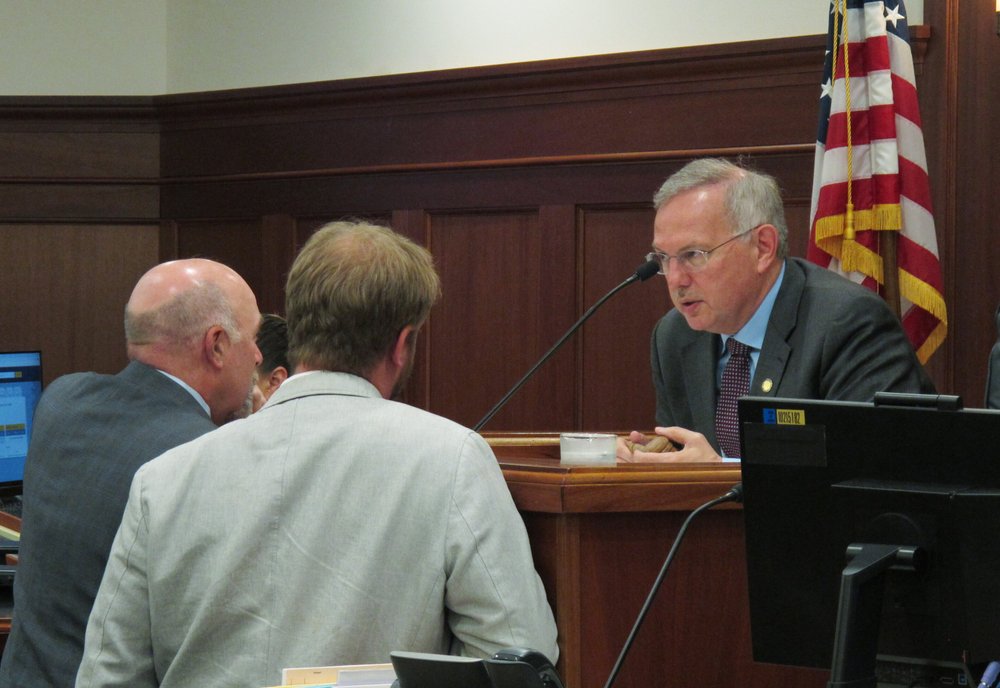By BECKY BOHRER

1 of 2Alaska House Speaker Bryce Edgmon, right, speaks to Reps. Adam Wool, left, and Grier Hopkins before the start of the House floor session on Monday, July 29, 2019, in Juneau, Alaska. The House passed a funded capital budget on Monday. (AP Photo/Becky Bohrer)
JUNEAU, Alaska (AP) — The Alaska Legislature on Monday approved a roughly $1,600 oil-wealth fund dividend to residents this year as part of a measure that also seeks to reverse many of Gov. Mike Dunleavy’s operating budget vetoes.
The legislation now goes to Dunleavy, who called it “a dark day for the PFD and for Alaskans who support the PFD and for those that are looking at a sustainable budget. These add-backs take us in the other direction.”
PFD refers to the Permanent Fund dividend, which is traditionally paid annually with earnings of the oil-wealth fund, the Alaska Permanent Fund. The amount approved Monday also would include funding from the statutory budget reserve.
Dunleavy, a Republican, has supported a dividend payout in line with a calculation that has not been followed the last three years, a calculation that critics say is unsustainable. Such a payout would equate to checks of about $3,000 this year.
Dunleavy could veto any of the spending with which he doesn’t agree. He told reporters Monday he wanted to look at the package being sent to him.
“Reductions and efficiencies have to be part of a sustainable budget plan,” he said.
Sen. David Wilson, a Wasilla Republican, voted for the bill after unsuccessfully proposing that a $1,600 dividend be paid this year and the remainder of a full payout be paid by May 1.
He said he worried that without a compromise with Dunleavy, the same debates would continue to be rehashed and false hope could be given to programs or services when lawmakers don’t know what the ultimate outcome will be.
Majority Republican Sens. Shelley Hughes and Mike Shower appeared briefly during the Senate floor debate before being shown as excused, without a public explanation. They did not immediately respond to emails seeking comment.
Before this year’s session began, the Senate majority said caucus rules do not call for automatic removal of members who fail to support a majority budget but leave members open to consequences. Eagle River Republican Sen. Lora Reinbold was the lone dissenter. She said the bill is not fiscally responsible.
The measure, among other things, restores much of the $130 million Dunleavy vetoed for the University of Alaska system and adds $5 million for the state ferry system, from which the Legislature had cut more than $40 million.
Reinbold also said until legislators can muster the votes to change the dividend calculation in law, they should not be “law breakers.”
|
|
In 2017, the Alaska Supreme Court ruled that absent a constitutional amendment, the dividend must compete for funding like other state programs. The decision came in a lawsuit that unsuccessfully challenged then-Gov. Bill Walker’s authority to reduce the amount of money available for dividends.
Lawmakers last year began using permanent fund earnings to help pay for state government and passed a law seeking to limit what can be withdrawn for dividends and government. There was no serious discussion of any statewide taxes this year.
Right before the vote was finalized, Republican Sen. Peter Micciche of Soldotna changed from a “no” to a “yes.”
“I voted yes to move this session along to a possible compromise because for God’s sake, it is August in two days and Alaskans deserve resolution,” he said in a floor speech.
Micciche said he thinks a full dividend should be part of any compromise, along with some budget add-ins.
Sen. Natasha von Imhof, a co-chair of the Senate Finance Committee, said she saw the package with the roughly $1,600 dividend as a fair compromise.
Earlier Monday, the Legislature passed a funded infrastructure budget, with the House securing the necessary votes to do so on its third try this special session.
The capital budget relies on funding from the constitutional budget reserve fund and the 23-member House majority had struggled to get the necessary votes. That fund requires 30 votes in the House to tap.
Rep. Dave Talerico, who was absent for the prior votes, voted in favor Monday, and Rep. DeLena Johnson, a prior “no” vote, also voted in support. The final vote on the funding provisions was 31-7.
The bill includes language intended to prevent various accounts, including those used for rural energy costs and student scholarships, from being swept into the constitutional budget reserve to help repay money that has been taken from it.
Senate Democratic Leader Tom Begich cited the House vote as an example of positions changing and said he was confident in reaching a compromise with the Dunleavy administration.
Minority House Republicans pushed to end the special session Monday, arguing that lawmakers had addressed the special session issues they’d been asked to consider. But neither the House nor the Senate immediately did so.
“We are leaving all options open for the final week of the special session,” House Speaker Bryce Edgmon, an independent, said in a statement.

